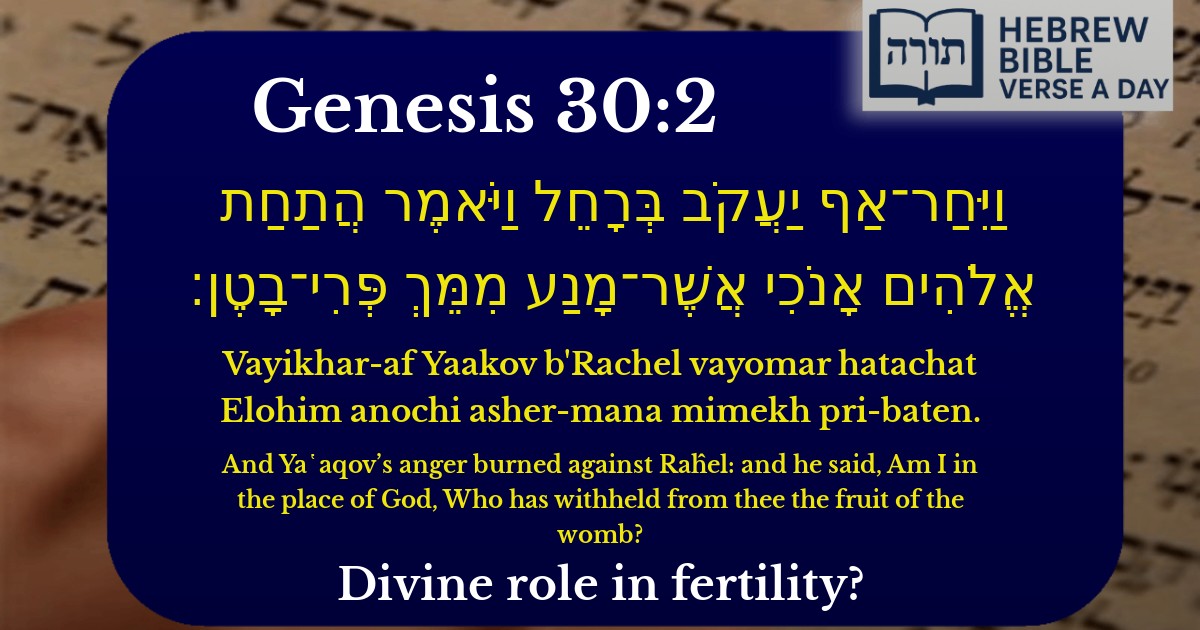Join Our Newsletter To Be Informed When New Videos Are Posted
Join the thousands of fellow Studends who rely on our videos to learn how to read the bible in Hebrew for free!
Hebrew Text
וַיִּחַר־אַף יַעֲקֹב בְּרָחֵל וַיֹּאמֶר הֲתַחַת אֱלֹהִים אָנֹכִי אֲשֶׁר־מָנַע מִמֵּךְ פְּרִי־בָטֶן׃
English Translation
And Ya῾aqov’s anger burned against Raĥel: and he said, Am I in the place of God, Who has withheld from thee the fruit of the womb?
Transliteration
Vayikhar-af Yaakov b'Rachel vayomar hatachat Elohim anochi asher-mana mimekh pri-baten.
Hebrew Leining Text
וַיִּֽחַר־אַ֥ף יַעֲקֹ֖ב בְּרָחֵ֑ל וַיֹּ֗אמֶר הֲתַ֤חַת אֱלֹהִים֙ אָנֹ֔כִי אֲשֶׁר־מָנַ֥ע מִמֵּ֖ךְ פְּרִי־בָֽטֶן׃
וַיִּֽחַר־אַ֥ף יַעֲקֹ֖ב בְּרָחֵ֑ל וַיֹּ֗אמֶר הֲתַ֤חַת אֱלֹהִים֙ אָנֹ֔כִי אֲשֶׁר־מָנַ֥ע מִמֵּ֖ךְ פְּרִי־בָֽטֶן׃
🎵 Listen to leining
Parasha Commentary
📚 Talmud Citations
This verse is not quoted in the Talmud.


Yaakov's Anger Towards Rachel
The verse (Bereshit 30:2) describes Yaakov's strong reaction to Rachel's plea for children. Rashi explains that Yaakov's anger stemmed from Rachel's improper phrasing, as if she were accusing him of withholding children from her. Yaakov responds by emphasizing that fertility is solely in Hashem's hands, not his own.
The Meaning of "הֲתַחַת אֱלֹהִים אָנֹכִי"
Yaakov's rhetorical question "Am I in the place of God?" carries deep theological significance. The Ramban notes that Yaakov was teaching Rachel an essential lesson about divine providence - that human beings cannot control matters that are strictly under Hashem's domain. The Sforno adds that Yaakov was reminding Rachel that even the righteous tzaddikim do not have power over matters of fertility.
Rachel's Emotional State
The Midrash (Bereshit Rabbah 71:7) provides context for this exchange, explaining that Rachel spoke out of deep anguish. However, the Talmud (Berachot 10a) derives from this incident that one should not speak improperly even when distressed, as Rachel's words provoked Yaakov's rebuke.
Lessons in Prayer and Acceptance
Spiritual Interpretation
The Zohar (1:164b) offers a mystical reading, suggesting that Yaakov was hinting to Rachel about the need for spiritual preparation to merit children. His words contained both rebuke and guidance, pointing her toward proper divine service rather than human solutions.